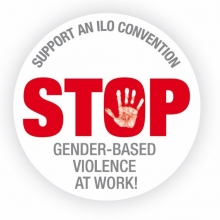ILO: towards a standard against violence and harassment in the world of work

Violence and harassment at work is a complex and multi-dimensional issue that presents numerous challenges for ILO constituents. It has an impact not only on workers and employers, but also on their families, communities, economies and society as a whole. It involves multiple forms of physical and psychological violence that affect different groups of people in many different ways, depending on a number of factors such as gender, class, race and power relations.
From the onset, the experts who met in Geneva in October 2016 had to address these and other aspects that are at the roots of violence and harassment in the world of work. In doing so, the experts had wide-ranging discussions on the nature, causes, and action needed. Their conclusions evidence that violence and harassment can potentially affect anyone; it can be both “horizontal and vertical, from internal to external sources, in the public and private sector, or in the formal or informal economy”. However, circumstances such as working in contact with the public, with people in distress, in isolation, without labour rights, or in conflict zones, increase the risk of violence. In addition, some groups of people, such as women, migrants, under age workers, and others are more vulnerable to violence and harassment. The experts also identified forms to tackle the issue and suggested that an integrated approach that includes prevention, protection, and sanctions, will be needed.
At its 328th session, the members of the ILO Governing Body endorsed the work and views of the experts and recognized that current ILO standards have limitations for addressing violence and harassment in the world of work. As a result, they all concurred that a new instrument that embraces a zero-tolerance principle is needed. Although it has a wide support from all the ILO constituents, there are some discrepancies in relation to the scope of the new instrument; whereas the workers would like to see the adoption of a Convention (a binding treaty open for ratification), the employers would rather adopt a Recommendation (non-binding guidelines).
The first discussion on the new instrument will take place at the 107th session of the International Labour Conference, in June 2018. An important aspect of the new standard will be the recognition that freedom of association and the right to collective bargaining are crucial for tackling violence and harassment in the world of work, specially gender-based violence, which is transversal and prevails in all the forms of violence and harassment.
The World Women's Committee of PSI (WOC), at its latest meeting of 22 November 2016, welcomed the decision and stressed the need of the international trade union movement to activate a global campaign to influence the member states of the ILO so that the standard takes the form of a binding international instrument.
Programme for the preparatory stages of the 1st discussion at the International Labour Conference:
- 30 April 2017 - Dispatch of the preliminary report containing a synopsis of law and practice accompanied by a questionnaire;
- September 2017 - Deadline for the receipt of replies to the questionnaire
- March 2018 - Dispatch of the first report to governments
- June 2018 - First discussion at the 107th Session of the Conference
More info:
- Governing Body of the ILO - Outcome of the Meeting of Experts on Violence against Women and Men in the World of Work
- ITUC Campaign: ITUC GBV campaign webpage
Also see:
- PSI’s report: “Tackling Violence in the Health Sector” (Download PDF)
- Case studies on violence at work:
- Congo (DRC): Solidarité Syndicale des Infirmiers du Congo (SOLSICO) (Download PDF)
- Video: Interviews SOLSICO (DRC) activists in health care (on YouTube) – in French, subtitled in English
- Argentina: Asociación Sindical de Profesionales de Salud de la Provincia de Buenos Aires (CICOP)
- Video: Workshop on Violence in the Workplace (on YouTube) – in Spanish, subtitled in English
- Philippines: Alliance of Filipino Workers (AFW) (Download PDF)
International day for the Elimination of Violence against Women (#VAW):
- PSI Statement for VAW 2016: Saving Lives Needs Safety!
- Posters for VAW 2016: Int'l Day for the Elimination of Violence against Women
- ILO, ICN, WHO, PSI Framework Guidelines: Framework guidelines for addressing workplace violence in the health sector available for download in English - French - Russian - Spanish

